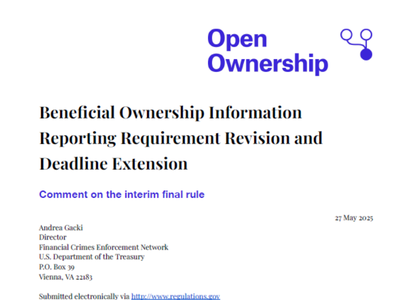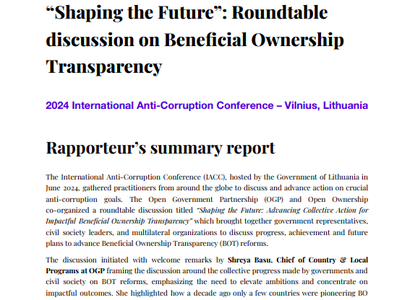USA adopts a central beneficial ownership register

In late 2020, the US government passed the National Defence Authorisation Act which included important corporate transparency reforms. As a result of this Act, the majority of companies, about 87% in the US, will soon have to disclose their beneficial owners to the U.S Treasury’s Financial Crimes Enforcement Network (FinCEN), although this will not be made public. It also includes, in, Section 885 a stipulation that all federal contracts in excess of $500,000 to publicly disclose their beneficial ownership information as well.. Whilst it is encouraging that such a high percentage of companies will be disclosing their beneficial owners, there are many important types of businesses that are not required to. These include publicly listed companies, as well as companies that:
- have more than 20 full-time employees;
- report more than $5 million in yearly revenue to the Internal Revenue Service;
- have an operating presence at a physical office within the US.
Thom Townsend, Executive Director for Open Ownership (OO) welcomed the USA’s decision:“This is not a small step for the US: it is a huge leap, and several decades in the making. When the world’s largest economy finally decides to end anonymity for shell companies, it is a cause for celebration and its impact will be felt across the world. With this new act, the US will become a far less attractive destination for those wishing to hide assets. However, the exemptions listed above highlight the fact that the legislation forces the disclosure of beneficial ownership (BO) for shell companies and investment vehicles. Compare this to the EU’s Fifth Anti-Money Laundering Directive which requires public disclosure of all privately held companies regardless of size.”
BO disclosure to central government is critical for ensuring a holistic approach to ensuring integrity and good governance. The internal application of BO data is also important for tax purposes and for understanding the ultimate destination of public funds spent on procurement. There is a risk that the US approach will not fully realise the potential benefits, although a public BO disclosure requirement has been mandated within this legislation for all awardees of federal contracts above $500,000. This step indicates a clear endorsement of the necessity of BO disclosure in public procurement, but falls short of providing the legislative basis for citizens to be able to follow all public monies to the point of their ultimate beneficiaries. Nevertheless, central registers of this kind are an important stepping stone toward beneficial ownership transparency (BOT), and will allow for easier information sharing across borders as well as broadening access to citizens.
OO’s work on implementing central and public BO registers elsewhere in the world has informed discussions in the US. The recommendations in OO’s briefings have supported partner organisations advocacy efforts on defining BO and setting thresholds. Zoe Reiter, Director of Civic Engagement at the Project On Government Oversight, co-founder of the Anti-Corruption Data Collective, and executive committee member of the FACT Coalition, said “OO’s guidance material has been a critical input to our proposals for beneficial ownership transparency in US legislation.”
Next steps
Now that primary legislation has been passed, there is an important regulatory phase to come that will define the practical operation of the new law. In our view, the important areas to watch out for are:
- The interpretation by government agencies of the two different BO definitions in the Act.
- The scope and detail of federal government’s annual reporting requirements on the efficacy of the new legislation as well as the range of competent authorities domestically and internationally that can access the data
- Real estate/private equity impacts - there is a civil society push to return to unfinished rule-making of the 2015 FinCEN rule requiring investment advisers to establish effective AML programs. The goal here is to effectively remove the exception for investment fund managers under current AML program requirements.
- Civil society in the US is likely to push to ensure geographical target orders (GTOs) are effectively applied in the real estate sector - a GTO can be issued by the US Treasury which orders record-keeping requirements relating to real estate transactions occurring within defined geographic areas
- Full clarity and definition on the range of exceptions that are being proposed and whether they are appropriate
Related articles and publications
Publication type
News article
Country focus
United States of America
Open Ownership Principles
Central register


